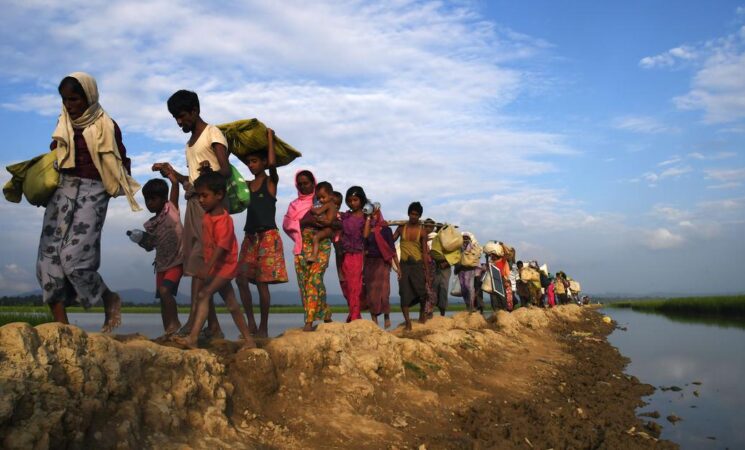27 March 2024, NIICE Commentary 8992
Dr. Beena
Introduction
In recent years, India has witnessed a significant influx of refugees seeking safety and a better future. As the country grapples with this complex issue, it becomes imperative to explore transformative approaches to refugee policy and social integration. By adopting a multidimensional analysis, this article aims to shed light on the challenges faced by refugees in India, examine the existing policy frameworks, and propose innovative strategies for fostering inclusive social integration.
Understanding the Refugee Landscape in India
India, a signatory to international conventions on refugees, hosts a diverse range of displaced populations, including refugees from neighboring countries, such as Afghanistan, Myanmar, and Sri Lanka, as well as internally displaced persons (IDPs) from various regions within India. The existing policy framework primarily relies on ad hoc measures and lacks a comprehensive approach to address the multifaceted challenges faced by refugees.
Challenges to Refugee Integration
Socio-cultural dynamics play a pivotal role in shaping the experiences of refugees in their host communities. Language barriers, cultural differences, discrimination, and marginalization pose significant challenges to their integration. Limited access to education, healthcare, and livelihood opportunities further exacerbate their vulnerability. Moreover, the presence of pre-existing social structures often creates barriers to meaningful social interaction and inclusion.
Examining Policy Frameworks
To address the challenges faced by refugees, it is essential to evaluate existing policy frameworks. India's current approach to refugee policy primarily centers on ad hoc and case-by-case decision-making processes. A comprehensive and inclusive legal framework that recognizes the rights of refugees and outlines their entitlements is crucial. Additionally, a holistic policy approach should encompass education, healthcare, livelihood, and social welfare support.
Transformative Approaches to Refugee Policy
Legal Reforms: Implementing legal reforms that provide a clear pathway for refugee protection, including the establishment of a dedicated refugee law, can ensure consistent and equitable treatment of refugees. The law should outline their rights, including access to education, healthcare, and employment opportunities.
Strengthening Institutional Mechanisms: Developing specialized institutions and strengthening the capacity of existing government agencies responsible for refugee affairs can enhance the effectiveness of refugee policy implementation. This includes streamlining administrative processes, establishing dedicated refugee camps, and creating efficient systems for documentation and identification.
Access to Education and Healthcare and Skill Development: Education and healthcare are essential components of social integration for refugees. Access to quality education equips them with the skills and knowledge needed to succeed and contribute to society. Investing in education and skill development programs tailored to the specific needs of refugees can empower them to become self-reliant and contribute positively to society. Likewise, adequate healthcare services ensure their physical and mental well-being. Transformative approaches should focus on removing barriers to education and healthcare, such as addressing language barriers, providing specialized support for trauma-affected individuals, and increasing awareness among healthcare providers about the specific needs of refugees. Collaboration with educational institutions, NGOs, and private sector entities can facilitate access to quality education and vocational training.
Community Engagement and Social Cohesion: Building social cohesion and fostering community engagement are integral to successful refugee integration. Transformative approaches should focus on initiatives that promote dialogue, cultural exchange, and meaningful interaction between refugees and the host communities. Promoting community engagement and raising awareness among host communities about the rights and contributions of refugees can foster a more inclusive environment. Encouraging participation in community activities, organizing joint events, and creating platforms for refugees to share their stories and experiences can foster empathy, dispel stereotypes, and bridge divides.
Employment and Economic Empowerment or Integration: Sustainable economic integration is crucial for refugees to achieve self-reliance and social inclusion. Facilitating economic integration through targeted livelihood programs, microfinance initiatives, and entrepreneurship support can enable refugees to secure sustainable livelihoods. Public-private partnerships and collaborations with local businesses can create employment opportunities and promote economic self-sufficiency. Transformative approaches should include initiatives that facilitate access to employment opportunities, promote entrepreneurship, and offer skill development programs tailored to the specific needs of refugees. Collaborations between government agencies, employers, and NGOs can play a vital role in creating employment avenues and promoting economic empowerment for refugees.
Conclusion
Transformative approaches to refugee policy and social integration in India are crucial to creating an inclusive society that upholds the rights and dignity of refugees. By adopting a multidimensional analysis that encompasses legal, social, economic, and cultural dimensions, India can foster an environment that enables refugees to thrive and contribute to society. Implementing comprehensive legal reforms, strengthening institutional mechanisms, investing in education and skill development, promoting community engagement, and facilitating economic integration are essential steps toward achieving transformative change. India’s rich history and ethos of inclusivity provide a strong foundation for embracing refugees and ensuring their successful integration. By enacting progressive policies and forging collaborations with various stakeholders, India can demonstrate leadership in addressing the challenges.
Dr. Beena was a Post Doc Fellow at the Delhi School of Transnational Affairs, University of Delhi, India.

